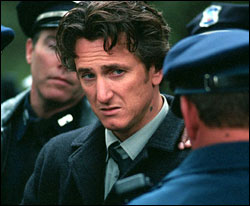HERE IS THE sentence that came out of nowhere, invaded the brain of best-selling mystery writer Dennis Lehane, and inspired him to write his most ambitious novel, Mystic River: “Brendan Harris loved Katie Marcus like crazy, loved her like movie-love, with an orchestra booming through his blood . . . “
Clint Eastwood, director of the film version of Mystic River (which opens Wednesday, Oct. 8, at Pacific Place), isn’t really into Lehane’s kind of “movie-love.” His esthetic is ultra-sane, slow and deliberate as a gunfight showdown, manfully tight-lipped, never out of controllike his mentor, Don Siegel, the Auteur With No Name. The music Eastwood composed here is not “booming” but reflectively melancholy. He’s said he hates music that overwhelms a scene.
Even so, there’s plenty of passion in his movieit’s just tamped down, a banked fire that burns for years just under the surface. Brendan Harris does love Katie Marcus like crazy, but he’s forced to suppress all expression of it in public, because Katie’s dad Jimmy (Sean Penn) hates his guts. Jimmy is the gangster godfather of their scrappy Boston hood, and if he caught Brendan with Katie, he’d use those guts for a noose. We only glimpse the intensity of the kids’ romance in Katie’s ecstatic dance on a bar top the night she decides to elope, and in Brendan’s teary eyes the next morning, after she’s found dead in the park.
Penn then gets a showy scene, bawling and brawling with the line of cops holding him back from the police tape. It might win him an Oscar, but it’s clichéd, and such overt displays of emotion are not Clint’s thing. Penn’s performance gets better when his face hardens, his eyes get slitty, and he dispatches his thug underlings, the leather-clad Savage Brothers, to find the killer before the cops can. He suspects Brendan.
But another suspect emerges as well: Jimmy’s childhood pal Dave, who was caught as a kid scratching his name in cement, then raped by some psycho cops, an experience that inscribed itself in cement in his soul. Today, he’s a pitiable drunk, a permanent child; instead of a job, he has his obsession with vampires, wolves, furtive creatures enacting dramas of control in the night.
Tim Robbins is superb as Dave, his face half-lost in shadows, like the dark doppelgänger of one of Clint’s good/ bad/ugly heroes. His fragile wife, Celeste (Marcia Gay Harden, better here than in Pollock, for which she earned an Oscar), is terrified when he comes home one night all bloody, saying he maybe killed a man, vague about details, also on the night of Katie’s murder. Dave does not reassure her by staying up late watching John Carpenter’s Vampires and muttering, “You see . . . it’s like vampires, once it’s in you, it stays. Hurting someone, it makes you feel alien. I can’t trust my mind anymore.” Lehane worked with abused and mentally handicapped kids before turning novelist. He, Robbins, and Eastwood have crafted one authentic, tormented character in Dave. If he wins one, Penn should hand his Oscar to Robbins.
BY CHANCE, THE COP who catches the case is another of Jimmy’s childhood chums, Sean (Kevin Bacon), and formally, the movie becomes a standard, police-procedural CSI White-Trash Boston. Bacon, a talented man trapped in a no-talent role, can’t transcend the genre. The other guys get brilliantly imagined wives, but Bacon’s Sean has an estranged wife who keeps calling him and saying nothing, a conceit that may have worked on the page but clunks here. Sean’s bond with Jimmy and Dave, his torment when he suspects them of crimes, his bickering with cop partner Laurence Fishburne about his loyalty to them, are all ho-hum TV contrivance.
But the investigation does move efficiently along, and everything else about the movie is profound. The theme is doubles: sunny childhood and stormy age; Dave and the vampires; soft wife Celeste and hard moll Annabeth (Laura Linney), Jimmy’s second wife; crimebuster Sean and crimebusted Jimmy; Sean’s mute wife and Brendan’s mute brother; Brendan as he first appears, vulnerable, and later, when he transforms à la Edward Norton in Primal Fear. Eastwood is after something different here than in his ambitious 1992 Western, Unforgiven. Instead of summing up a genre with a kind of exalted, gorgeously operatic mise- en-scène, he goes for a rather average detective-show ash-can realism. Unforgiven owed so much of its greatness to the cinematography and set design; here, the look is standard-issue drab, the shots are intelligent, but quiet, and the star is pretty much editor Joel Cox.
That’s because River depends more on parallel scenes than Unforgiven did. The best, most thrilling moments of the film dramatize the simultaneous investigation of two theories of the crime. The montage expertly builds tension and ratchets up our emotions. Brian Helgeland, who crafted the comically incompetent sprawl of James Ellroy’s novel into the movie clockwork of L.A. Confidential, helps achieve similar effects here.
Clint Eastwood achieves something, too: his first masterpiece since Unforgiven.








